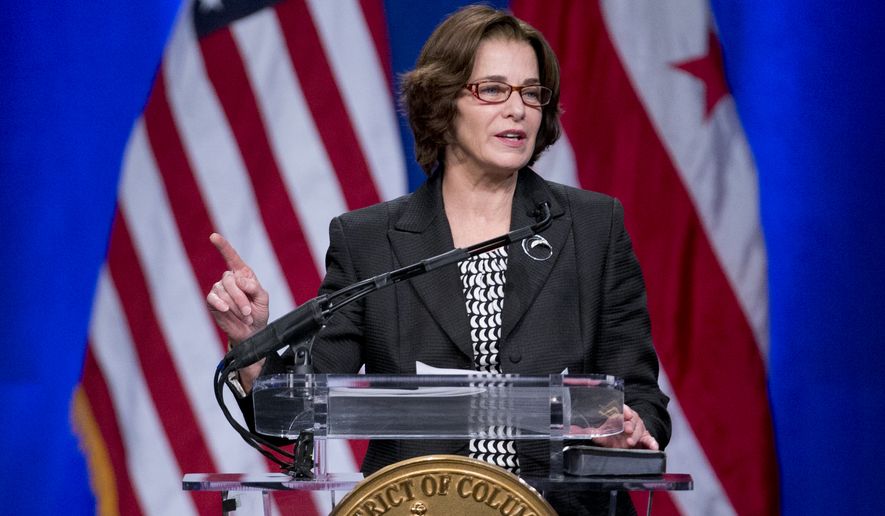The D.C. Council on Tuesday gave overwhelming preliminary approval to legislation that would authorize doctors to prescribe lethal doses of medication to terminally ill patients with a prognosis of six months or less to live, placing the District on track to join five states that permit physician-assisted suicide.
Sponsored by Ward 3 Democrat Mary M. Cheh, the Death With Dignity Act passed by an 11-2 vote. Council members Yvette Alexander, Ward 7 Democrat, and Brianne Nadeau, Ward 1 Democrat, cast the opposing votes.
Ms. Alexander said the bill does not contain sufficient safeguards against the potential for abuse or medical error, and would create a climate of distrust between medical professionals and their patients.
“These unresolved concerns include the coercion or undue influence on the elderly, disabled or poor; lack of oversight during the administration of the drug; the difficulty in predicting an individual’s final six-month window to live; the pressure on physicians to engage in behavior in contradiction to the Hippocratic oath; and finally, the creation of greater mistrust between the medical community and residents,” Ms. Alexander said during deliberation.
Ms. Cheh rebutted such concerns.
“Now some say under this bill there will be coercion — vulnerable people will be hastened to their death, it will cut off lifesaving care, insurance coverage,” she said. “These are baseless fears, and no matter how earnestly they may be held, no matter how often they may be repeated, they are without foundation. There are sturdy protections in this bill against the parade of horribles that have been trotted out.”
Four states — California, Oregon, Vermont and Washington — have enacted physician-assisted suicide legislatively or via ballot measure since 1994, when Oregon became the first state to legalize the practice through a direct vote. The Montana Supreme Court ruled in 2009 that nothing in state law prohibits doctors from fulfilling requests for lethal drugs from mentally competent, terminally ill patients who wish to die.
The D.C. Council must vote one more time on the bill, which could be as early as Nov. 15, before it goes to the desk of Mayor Muriel Bowser for final approval. Miss Bowser’s office did not respond to a request for comment.
The bill would require terminally ill patients to consult with two doctors over a span of at least two weeks in order to obtain the fatal drugs. Two witnesses must also attest to the voluntary nature of the decision.
During debate on the legislation, several council members expressed reservations with the idea of physician-assisted suicide but said they were more uncomfortable with the idea of imposing their moral views on their constituents.
“While I have strong personal feelings with regard to the creation of the universe and humanity, I do not have the authority to impose my views on others,” said Anita Bonds, at-large Democrat. “I will not take the liberty of even thinking for others on a matter of life and death. And because of this, I am at peace voting in support of this bill.”
Others relayed personal stories or those of constituents about the agonizing deaths of loved ones. Council member Kenyan McDuffie, Ward 5 Democrat, fought back tears as he recalled the passing of his father this year.
“My family had to watch him suffer, and I wouldn’t wish that on anyone else,” he said. “That’s my story, but I’m not making this vote today based on my own story, because there are thousands of other people across the District who have had that same experience, and they should be able to make and decide for themselves what they want to happen when a loved one is terminally ill.”
But a group of physicians practicing in the city wrote a letter to the D.C. Council last month warning against the legislation’s potential for abuse and lack of safeguards.
The doctors noted that terminally ill patients are often depressed, but the bill “does not include a requirement that patients seeking assisted suicide first receive a psychological evaluation.”
Furthermore, they wrote that the Death With Dignity Act “would betray our healing mission enshrined by the Hippocratic Tradition which states, ’ I will give no deadly medicine to anyone if asked, nor suggest any such counsel. I will prescribe regimens for the good of my patients according to my ability and my judgment and never do harm to anyone.’”
“We do not regularly engage in the city’s legislative process, but we must do so now with one voice against proposed legislation that would legalize physician assisted suicide,” the doctors wrote. “This bill is dangerous, lacks any true safeguards, and is the wrong fit for D.C. residents.”
But Ms. Cheh said helping terminally ill patients end their lives is consistent with the Hippocratic oath’s maxim instructing physicians to abstain from doing harm.
“In this context, the injunction to do no harm really means to respect an imminently dying person’s last wish for control, for peace, to respect the choice to die with family and friends at home in tranquil circumstances,” Ms. Cheh said.
• Bradford Richardson can be reached at brichardson@washingtontimes.com.




Please read our comment policy before commenting.